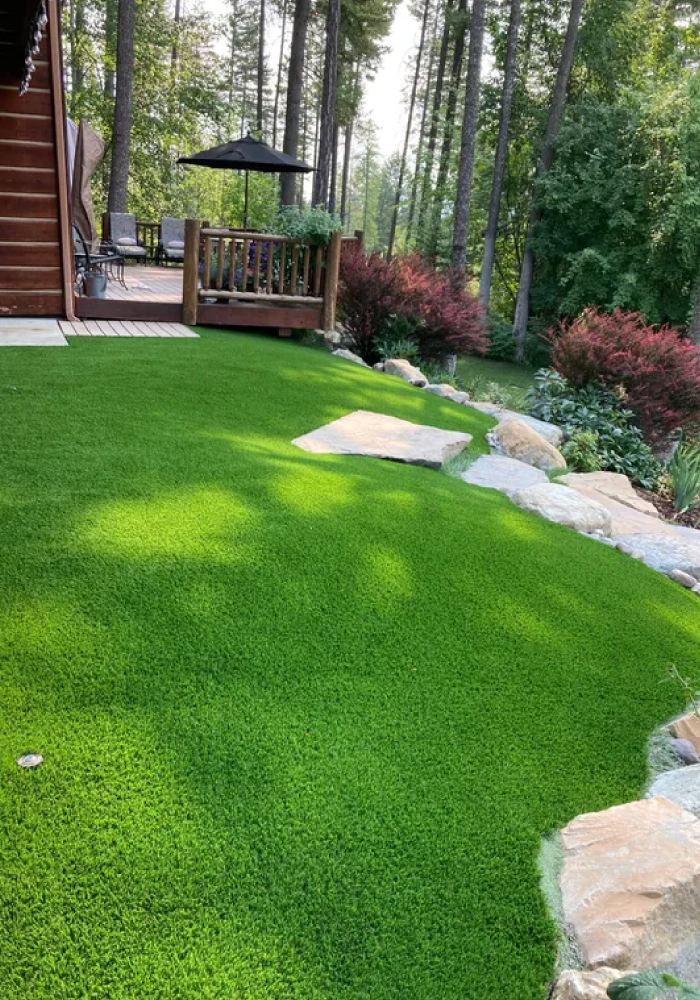Durable Arizona Artificial Turf for Home and Commercial Applications
Durable Arizona Artificial Turf for Home and Commercial Applications
Blog Article
Explore the Environmental Benefits of Opting for Artificial Grass Solutions
The fostering of synthetic lawn solutions provides an engaging chance to attend to pushing environmental difficulties. By significantly minimizing water use and reducing the application of hazardous chemicals, these choices not only promote lasting landscape design however additionally shield neighborhood communities.
Water Preservation Advantages
One of the most substantial benefits of synthetic lawn is its capacity to conserve water. In contrast, synthetic grass does not require watering, considerably minimizing the general demand for water resources.
By eliminating the requirement for normal watering, man-made lawn contributes to lasting landscape techniques and helps alleviate the ecological effect of too much water consumption. The conservation of water prolongs to the decrease of runoff, which can lead to soil disintegration and river contamination.
Furthermore, the installation of synthetic lawn permits municipalities and house owners to designate water sources more efficiently, concentrating on necessary usages such as alcohol consumption water and farming. The change in the direction of synthetic grass not only promotes liable water use yet additionally straightens with more comprehensive ecological objectives focused on protecting natural deposits.
As communities progressively prioritize sustainability, the water conservation benefits of man-made turf provide a compelling situation for its fostering in property and commercial landscape design projects.
Lowered Chemical Use
The change to synthetic grass significantly lowers the reliance on chemical therapies generally utilized in natural lawn maintenance. Standard turf monitoring usually entails the application of fertilizers, herbicides, and pesticides to advertise development and control bugs. These chemicals can posture risks to human health and wellness, regional wildlife, and the atmosphere, adding to soil and water contamination.
In contrast, artificial grass removes the demand for these damaging compounds. By decreasing the launch of synthetic compounds right into the ecosystem, synthetic grass advertises much healthier dirt and water systems.
Moreover, the lack of chemical runoff related to synthetic grass setups assists secure regional rivers from contamination, sustaining water life and keeping biodiversity. Artificial turf companies phoenix. As neighborhoods progressively prioritize sustainable methods, choosing for synthetic grass presents a practical service that lines up with environmental preservation goals. Via this shift, residential or commercial property proprietors can appreciate lush eco-friendly rooms without compromising eco-friendly health, leading the way for a much more sustainable future
Lower Carbon Footprint

In addition, the installment of synthetic grass can result in substantial water preservation. All-natural grass require substantial amounts of water for watering, which not just adds to the carbon impact connected with water removal and treatment but additionally pressures neighborhood water resources. On the other hand, fabricated turf requires marginal maintenance, requiring no watering, consequently significantly decreasing water use and its linked power prices.
Additionally, the longevity of synthetic grass adds to its lower carbon influence. With a lifespan of up to 15 years or more, the need for frequent replacements is lessened, causing much less waste and lower energy intake in production and dealing with conventional yard alternatives. On the whole, synthetic grass presents a sustainable alternative for eco mindful landscape design.
Environment Conservation
Environment conservation is a critical consideration in the argument over landscaping choices, particularly when contrasting fabricated lawn to natural turf. Natural grass yards often require comprehensive maintenance, including using herbicides, plant foods, and pesticides, which can negatively affect local environments. These chemicals go to my blog can leach right into the soil and waterways, hurting native vegetation and fauna and interfering with neighborhood habitats.
Artificial grass gets rid of the demand for hazardous chemicals, consequently shielding neighboring wildlife and preserving the honesty of bordering ecosystems. The installation of artificial turf can lead to the conversion of former grass areas right into even more biodiverse landscapes, such as pollinator yards or indigenous plant areas, which can support regional wildlife.
Ultimately, the shift to man-made lawn not just saves water and decreases maintenance efforts but likewise fosters a more unified partnership in between human tasks and the native environment, promoting habitat preservation while doing so.
Long-Term Sustainability
Long-term sustainability is a critical consider evaluating the benefits of synthetic grass over traditional grass yards. Among one of the most considerable benefits of synthetic grass is its toughness; it can last approximately 15-20 years with minimal maintenance, whereas natural lawn calls for constant reseeding and replacement. This durability minimizes the need for constant resources, such as water, fertilizers, and pesticides, which are vital for maintaining a healthy and balanced grass yard.
Additionally, synthetic grass adds to a reduction in carbon exhausts connected with grass care devices. Traditional yards frequently need gas-powered mowers, trimmers, and blowers, every one of which add to air contamination. Artificial turf companies phoenix. On the other hand, man-made grass removes the requirement for such equipment, advertising a cleaner setting
In addition, the manufacturing of man-made grass increasingly makes use of recycled products, enhancing its sustainability account. As producers adopt green practices, the environmental impact of fabricated turf remains to decrease.

Verdict
The fostering of synthetic grass options offers substantial ecological benefits, consisting of significant water preservation, reduced dependence on damaging chemicals, and a lower carbon footprint. Moreover, synthetic grass help in maintaining all-natural environments by lessening land disruption and advertising long-term sustainability with using long lasting products. Collectively, these elements highlight the potential of artificial grass to contribute positively to environmental health and offer a viable alternative to traditional landscape design techniques in an increasingly resource-conscious world.
In contrast, fabricated lawn does not require watering, dramatically lowering the total need for water sources. By reducing the release of synthetic compounds into the ecological community, fabricated turf promotes much healthier dirt and water systems.
Furthermore, the setup of man-made lawn can result in considerable water preservation. In contrast, fabricated turf requires marginal maintenance, calling for no watering, thus see this website substantially lowering water usage and its linked energy expenses.

Report this page